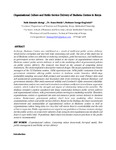| dc.description.abstract | In Kenya, Huduma Centres was established as a result of inefficient public service delivery, which led to corruption and was both time consuming and costly. The aim of this study was to see if Huduma centers are effective at reducing corruption, petty bureaucracy, and inefficiency in government service delivery. The study looked at the impact of organizational culture on Huduma centers' public service delivery, as well as the mediating effect of government policies on public service delivery. The research was based on the concept of competing values framework. The study employed a descriptive research design. The target population was branch managers of the 52 Huduma centres, 1456 supervisors and 1456 public customers from the government ministries offering public services in huduma centre branches. Multi-stage probability sampling was used. Both primary and secondary data was used. Primary data used self-administered questionnaires and Secondary data from reviewing relevant literature and government statistics. Pilot study measured validity and Cronbach’s alpha measured reliability. Inferential data analysis was used and it involved correlation coefficient (r) and linear regression analysis, which looked for the strength and degree of relationship between the variables. The findings revealed a positive significant low linear relationship between public service delivery and organizational culture, with government policies serving as a mediating variable. Therefore, organizational culture is significant but does not influence public service delivery in Huduma centres. Furthermore government policies don’t have any mediating effect between organizational culture and public service delivery. Based on the findings, the study recommends improvement and sustainability of organizational culture in Huduma centres as well as organizational culture being done in a way that will ensure there is accountability and the rule of law is respected. Public organisations are urged to use guidelines of human resource strategy for the public service, to avoid every ministry, from using its own regulations and standards and learn to cope with Covid 19 pandemic. More study into human resource practices in the public sector is recommended. | en_US |

